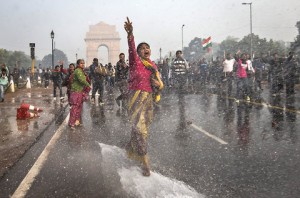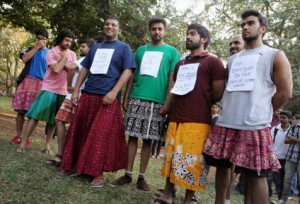This is War! Reflections on the Delhi Gang Rape
By Soma Chauduri
It has been difficult for me to write or even to comment on the horrific and barbaric gang rape of a 23-year old woman in Delhi, even after more than a month since the incident took place. I have yet to come to terms with how six human beings—all men, among them a minor of seventeen years—could act in the most barbaric form known against two fellow human beings. The gang rape revealed extreme emotions of misogyny and hatred that the six men had towards the young woman and her friend. The men wanted to teach her and her friend a lesson. The fault of the young man and woman: enjoying an evening show of Life of PI. Let me explain why the two young people were “at fault.”
The young woman’s fault was that she was a young, independent woman working hard pursuing her dream of being a doctor. That dream, too, was compromised from the very start when her family, despite selling some of their properties, could not afford the costs of medical school. So she settled on being a physiotherapist, the closest alternative to a medical degree that she, a woman from one of India’s poor migrant families, could afford. She had to be taught a lesson for daring to dream, to work, and to enjoy life according to her terms. She had to be taught a lesson because she protested against the assault on her friend by the six men. Newspapers have reported how she resisted throughout the horrific assault (which included penetration with a rusted L-shaped iron rod so severely that her intestines came out) and fought bravely against her attackers demonstrating exemplary courage.
The young man’s fault was that he was a young man who was accompanying a young woman. He had no right to enjoy an evening where “having fun” did not include harassing women, passing lecherous comments, sexually abusing women, and not supporting the six men when they decided to demonstrate their masculinity. He was not a “real” man! After all, isn’t masculinity all about teaching women what their real place is in this world? So how could he dare to protest when the six men decided to teach the woman a lesson?
Ask any woman (any age, any class, any religious or caste background) about sexual harassment on the streets of urban India, and she will tell you, not one, not two, but of many incidents of sexual violence against her. These can range from the seemingly harmless whistles, comments on her clothes, dress, make up, to unwanted slight brushing of hands, bodies, groping various parts of her body, and stalking–the list of things that are not considered serious enough to lodge a police complaint, let alone classified in the range of sexual violence. And then there are those incidents that occasionally make it to the news: the rapes and the public stripping. This is a part of our daily experience, the price that a woman must pay if she dresses up, wears makeup, goes out of her home, commutes, and leads a normal life that includes going out at night and taking a stroll at the park. And if she is harassed, stripped, raped and/or taught a lesson, the fault lies with her.
Let me describe another rape case that took place earlier last year in Kolkata, my city. Five men raped a woman, men she had met at a nightclub in one of Kolkata’s trendiest hotels. The Joint Commissioner of Police, Crime Branch (one of the very few women senior officers in Kolkata Police) supported the victim’s statement and confirmed that a rape had indeed taken place. However, the government of West Bengal (also headed by a women) publicly commented that that this was no rape, but a sex worker-client transaction gone wrong. Surely, no woman of good moral character gets raped, and if she does she must have done something to provoke it. The fault always lies with the victims of the sexual assaults, the women! The rapists, the perpetrators of sexual assault are merely doing their job as men. So beware if you are the rape victim, if you want to speak out against violence against women, or stand up for what is justice in India: you will be sidelined, punished, drenched with water cannons, have tear gas hurled at you, and your morality and virtue will be on the table for discussion.
The Delhi gang rape has attracted much attention from various groups thanks both to national and international media and social networking sites. Emotions are high, and in the midst of it we have rushed to give a name to the victim: we have called her Damini, Nirbhaya (fearless), “India’s daughter,” and Amanat (the precious). To me, these names once again mock the victim, symbolizing the chivalrous masculinity of our culture where we see the woman as someone who needs protection; someone who is fragile; and as someone who can be easily broken. Consider, for instance, the name Damini, taken from a very popular Bollywood film where the title character is not the woman who has been raped, but the woman who stands up on behalf of her raped maidservant. Thus, the heroine remains a virtuous woman who has not been defiled and has her “honor” intact. The raped maidservant meets the fate of most rape victims in Bollywood: she dies and thus becomes unable to fight her rapists. And we have turned to this popular culture to romanticize our image of this courageous woman in Delhi, who was violated brutally and who fought gallantly.
It is time we come out from under denial. We are living in a culture of violence against women (VAW). This is a human rights issue, and it should be treated as such. Almost half the population of the world’s largest democracy is affected by VAW and its outcomes; that is 541.4 million women! The young woman in the Delhi rape case did not want our Bollywood names; nor did she want to be India’s daughter. All she wanted was to enjoy an early evening movie, go back home, and work the next day in pursuit of her dreams of becoming a physiotherapist.
And for my women friends in the United States: be very afraid. The recent relapse of the 1994 Violence Against Women Act is troubling. Already we have signs of what lies ahead. The New York Times recently reported on how crimes against women have increased in a small town in North Dakota as the town’s population of single men has increased with a recent shale oil boom. Similarly, the brutal gang rape of a sixteen-year old girl by members of a Steubenville football team are constant reminders that you, too, are unsafe in this war against women.
Feminist organizations in India have been and are doing a critical job, particularly around the issue of rape and sexual violence on the streets of India. This is certainly a positive trend. According to a recent study published in American Political Science Review, feminist mobilizations in civil society creates maximum impact on behalf of women’s rights and is often the critical factor on VAW policies. Feminist organizations in India have raised their diverse voices in protest against the treatment of rape victims by the government, the police, and the legal courts, criticizing the archaic and unbelievably insensitive “two finger test,” and so on. This has created new leaders such as Kavita Krishnan, the secretary of the All India Progressive Women’s Association (AIPWA), whose voice has become the voice of protest of a nation frustrated with the neglect of violence against women. It has also inspired people (young, old, men, women), the ordinary everyday kind, to come out in protest and to express their solidarity with the women of India. Every day, we hear of campaigns to educate people against this violence. One of my favorites is of a campaign in Bangalore in which a group of twenty-five men dressed themselves in skirts to educate people that wearing a particular outfit does not legitimize the sexual harassment or rape of a woman. It is our right to wear what we want.
These are certainly inspirational times, and I am hopeful. Let us pledge that we do not let this movement die out, and let us win this war!
_______________________________________________
 Soma Chaudhuri is Assistant Professor of Sociology at Michigan State University. Her research focuses on violence (collective violence and domestic violence), social movements, gender, and witch hunts. She has published articles in the American Journal of Sociology, Mobilization, Violence Against Women, and Comparative Studies of South Asia, Africa and the Middle East. Her current projects include contemporary witch hunts in the tea plantations of Jalpaiguri, India (under contract with Lexington Books); and the negotiation of strategies to combat domestic violence in Gujarat, India. Her M.A. and Ph.D. in sociology are from Vanderbilt University and she holds an M.A. from Jawaharlal Nehru University, New Delhi. At Michigan State University, she also has a joint position in the School of Criminal Justice.
Soma Chaudhuri is Assistant Professor of Sociology at Michigan State University. Her research focuses on violence (collective violence and domestic violence), social movements, gender, and witch hunts. She has published articles in the American Journal of Sociology, Mobilization, Violence Against Women, and Comparative Studies of South Asia, Africa and the Middle East. Her current projects include contemporary witch hunts in the tea plantations of Jalpaiguri, India (under contract with Lexington Books); and the negotiation of strategies to combat domestic violence in Gujarat, India. Her M.A. and Ph.D. in sociology are from Vanderbilt University and she holds an M.A. from Jawaharlal Nehru University, New Delhi. At Michigan State University, she also has a joint position in the School of Criminal Justice.






0 comments